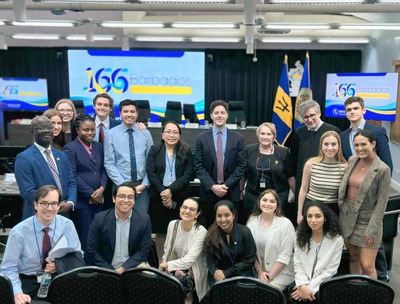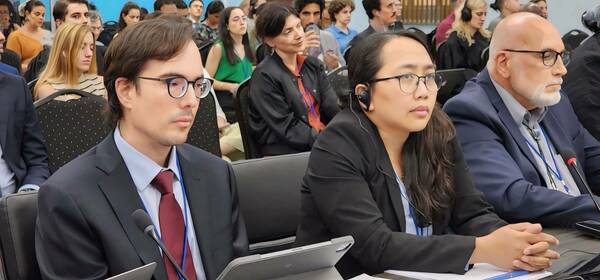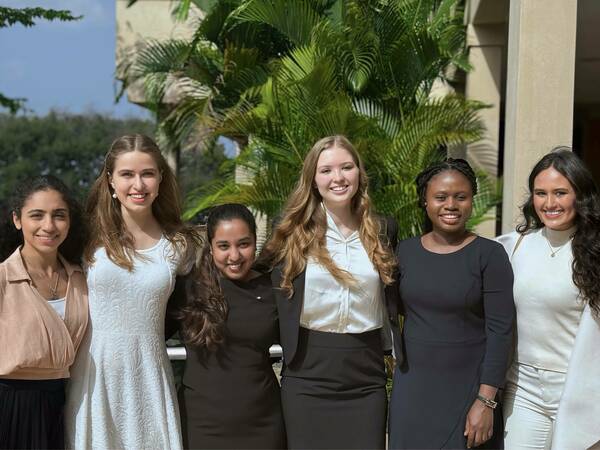 The Inter-American Court of Human Rights held its 166th Regular Session in Barbados last month, following an invitation from the Government of Barbados. During the Session, the Court held its Public Hearing on “The Climate Emergency and Human Rights,” an Advisory Opinion Request submitted by the Republics of Colombia and Chile. The Notre Dame Law School Global Human Rights Clinic and the Kellogg Institute's Notre Dame Reparations Design and Compliance Lab submitted an expert brief on this matter in December and participated in oral arguments on the brief. Oral arguments were made by Notre Dame Law School professors and Kellogg faculty fellows Diane Desierto and Francisco Urbina.
The Inter-American Court of Human Rights held its 166th Regular Session in Barbados last month, following an invitation from the Government of Barbados. During the Session, the Court held its Public Hearing on “The Climate Emergency and Human Rights,” an Advisory Opinion Request submitted by the Republics of Colombia and Chile. The Notre Dame Law School Global Human Rights Clinic and the Kellogg Institute's Notre Dame Reparations Design and Compliance Lab submitted an expert brief on this matter in December and participated in oral arguments on the brief. Oral arguments were made by Notre Dame Law School professors and Kellogg faculty fellows Diane Desierto and Francisco Urbina.
During the Public Hearing, the Judges posed several questions to Professors Desierto and Urbina, addressing their core arguments on the international legal principles of effectiveness in the interpretation of international treaties, the principle of proportionality, the principle of democracy and separation of powers, the inapplicability of states of emergency doctrines under the American Convention to address the climate crisis, and the Notre Dame Law School Global Human Rights Clinic’s practical recommendations to create human rights audits of the existing initial Nationally Determined Contributions (NDCs) of States that contain their climate mitigation ambitions and adaptation targets, while also ensuring that the next round of NDCs to be submitted in 2025 would be completely consistent with the obligations of the States Parties to the American Convention on Human Rights.
“This is generally expected to be one of the most important and wide-ranging opinions of the Court. The issues before the Court are extraordinarily complex,” said Urbina, associate professor of law at Notre Dame Law School.
The Barbados delegation from Notre Dame Law School included 18 participants consisting of faculty members; Notre Dame Law School Global Human Rights Clinic staff; and J.D., Human Rights LL.M., J.S.D., and undergraduate research students involved in the Clinic.
The inaugural Global Human Rights Clinic class consisted of the following: Kellogg PhD Fellows Nicolás Buitrago Rey and Pavithra Rajendran, along with Laura Allaben, Claire Crites, Harry Weeks, George Santangelo, Vitaliy Kosovych, Oluwaseun Ojo, Ángel Muñoz Carpintero, Valentina Salazar, Nourhan Fahmy, Ewa Rejman, Elizabeth Gonzalez, and Rachel DeGaugh.
 “Our students worked hard, prepared us all well for the arguments, followed the hearings, did the research and evidence analysis, and even did moot,” said Desierto, the founding faculty director of the Notre Dame Law School Global Human Rights Clinic.
“Our students worked hard, prepared us all well for the arguments, followed the hearings, did the research and evidence analysis, and even did moot,” said Desierto, the founding faculty director of the Notre Dame Law School Global Human Rights Clinic.
“I’m so proud of our inaugural Clinic class of law students and undergrad students! We received congratulations from everyone — judges and other parties — on the excellence of our oral arguments,” she added, noting that their work was a “joyful result of real teamwork.”
Harry Weeks, a rising third-year law student, said, “The Clinic was privileged to assist the Court in the immensely challenging task of defining the obligations of States under human rights law in response to climate change. This is of profound significance, linking a crisis of global scale with the essential duty to uphold the intrinsic dignity of each individual.”
“For me personally, involvement in this project marks a defining moment in how I imagined what being a lawyer might look like — one that was unexpected, yet indelibly transformative. Our participation, and that of Notre Dame as a whole, represents a momentous engagement with the problems of the world as they might be justly solved by law, not force and narrowly imagined self-help,” added Weeks.
According to Desierto, the Public Hearing on the Climate Emergency and Human Rights was the most genuinely inclusive international proceeding, being open to the participation of States, international organizations, civil society organizations, and renowned experts in climate change and human rights law.
Notre Dame Law School joined other groups and organizations that also participated in oral arguments, including: Columbia Law School, UN Special Rapporteurs, the Georgetown University Law Center, Oxfam, UCLA School of Law, Cornell Law School, and NYU School of Law.
 Kellogg PhD fellow Pavithra Rajendran, a J.S.D. candidate from Sri Lanka, said, “Representing a beautiful island, which faces the ongoing challenge of climate change, and teaching and researching environmental law for a while, I've been drawn to an anthropocentric approach to addressing climate change and its impact on human rights and existence. Witnessing distinct, yet innovative, solutions to tackle climate emergencies has been an inspiring experience.”
Kellogg PhD fellow Pavithra Rajendran, a J.S.D. candidate from Sri Lanka, said, “Representing a beautiful island, which faces the ongoing challenge of climate change, and teaching and researching environmental law for a while, I've been drawn to an anthropocentric approach to addressing climate change and its impact on human rights and existence. Witnessing distinct, yet innovative, solutions to tackle climate emergencies has been an inspiring experience.”
“Personally, actively collaborating with my peers and discussing new ideas in such stunning natural settings of Barbados has been a true privilege,” said Rajendran. “Coming from a region without a strong regional human rights body, experiencing the shared and unique perspectives of the Inter-American system has emphasized the importance of a regional human rights framework."
Desierto noted that the Public Hearing was the only international advisory opinion proceeding in all international courts that addressed the issue of reparative measures that States must take to ensure their compliance with all of their climate obligations and human rights obligations, especially for the most vulnerable populations of small island developing States, displaced children, persons of Afro-descent in Latin America, women, rural farmworkers, subsistence fishermen, and environmental defenders, among other populations.
Weeks concluded, “The hearings were a singular opportunity to answer a defining issue of our time: Given their duties to us as human persons, what obligations must our governments have to deal with the world-deranging effects climate change has wrought and will work on the world? It is exceedingly difficult to think of a question whose legal and practical meaning is more urgent and worthwhile.”
Notre Dame Law School’s Global Human Rights Clinic was selected to present its research on small island developing states, climate change, and human rights at the 4th United Nations Conference on Small Island Developing States, which will take place next week on May 27, 2024.
Learn more about the Notre Dame Law School Global Human Rights Clinic at https://ndlsglobalhumanrights.nd.edu/.
This story originally posted at law.nd.edu/news.





